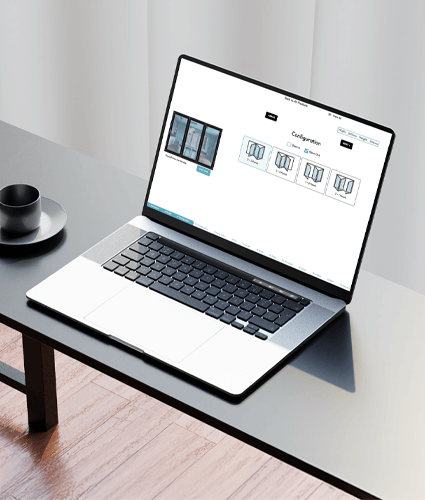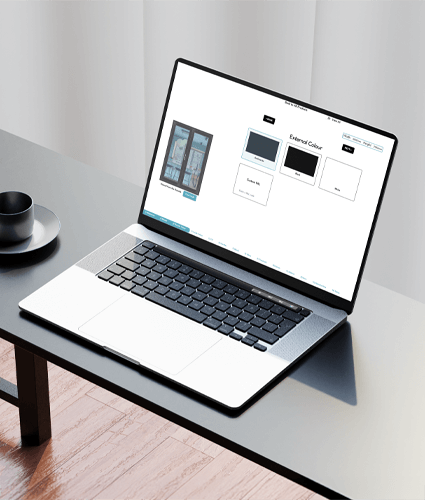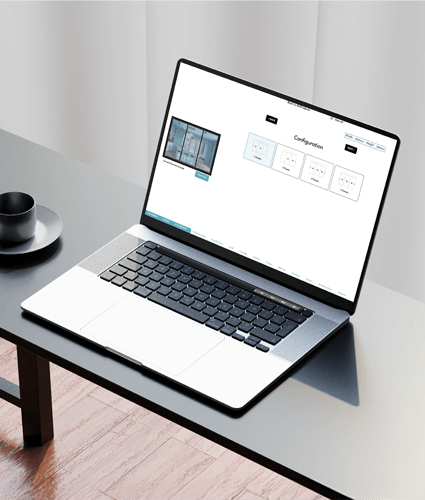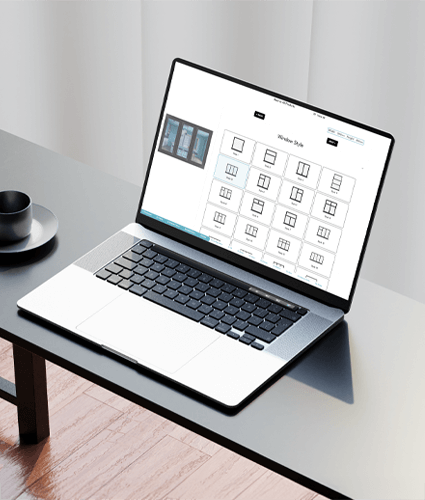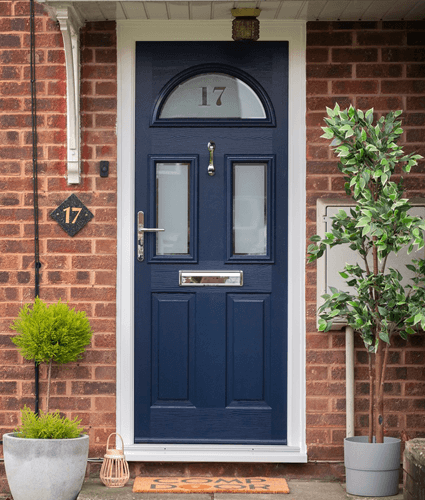Best Alternatives To Bifold Doors
When aiming to create a seamless connection between indoor and outdoor spaces, bifold doors have traditionally been a popular and functional choice. However, there are situations where homeowners might seek alternatives. Whether due to space limitations, architectural constraints, or personal preferences, exploring different door types can open up a range of design possibilities for your home or property.
In this comprehensive guide, we will explore a variety of alternatives to bifold doors, each offering unique features and benefits. From space-efficient sliding glass doors and the classic elegance of French doors to the modern appeal of pivot doors, we’ll delve into the practicality and quality of each option.
Additionally, we’ll cover pocket doors and accordion doors, considering French doors as an affordable alternative. We’ll also discuss the cost factor and emphasize the importance of choosing the right alternative based on personal preference, home design, and budget.
Let’s explore the world of alternatives to bifold doors and discover the exciting possibilities that await.
Sliding Glass Doors
Sliding glass doors provide a sleek and contemporary alternative to bifold doors. These doors are designed to be space-efficient while maximising natural light and offering unobstructed views. Their functionality is unmatched, effortlessly gliding open and closed, making them a practical choice for homeowners seeking convenience and ease of use. They are typically considered the best alternative to bi-folding doors for new extensions or when replacing outdated patio doors.
Pros of Sliding Glass Doors:
- Space-Efficient: Sliding glass doors are ideal for maximising floor space as they slide horizontally along a track, eliminating the need for swing space.
- Excellent Visibility: The large glass panels provide an expansive view of the outdoors, allowing an abundance of natural light to flood your living space.
- Ease of Operation: They operate smoothly on their tracks, making them effortless to open and close.
- Good Ventilation: When opened, they allow for a generous flow of fresh air into the home, helping to maintain good indoor air quality and providing natural cooling on warmer days.
Cons of Sliding Glass Doors:
- Heavier Compared to Some Alternatives: The glass panels can make sliding glass doors heavier, which might affect installation ease and require proper support during the fitting process.
- Maintenance: While generally low-maintenance, they may require occasional cleaning and lubrication to ensure smooth operation.
- Partial Opening: They do not open up the entire opening completely.
French Doors
French doors have long been admired for their classic beauty and timeless elegance. These double doors feature glass panels framed by wooden, uPVC, or metal frames, creating a refined and sophisticated look. Known for their versatility, French doors can seamlessly fit into various architectural styles, from traditional to contemporary, and are popular for both interior and exterior applications.
Pros of French Doors:
- Classic Beauty: French doors exude a charm and elegance that is hard to match. Their timeless appeal adds an element of sophistication to any space, often complementing art-deco, heritage, or industrial designs.
- Versatility: They can be customised to suit different design requirements and are available in various materials, including wood, aluminium, fibreglass, and uPVC. This provides plenty of options to match your personal style and home décor.
- Customisation Options: From glass choices to decorative grilles and hardware, French doors offer numerous customisation possibilities.
- Cost: French doors are one of the most affordable alternatives to bi-folding doors.
Cons of French Doors:
- Space Requirement: French doors require swing space for opening, so it’s essential to consider the available room when choosing this option.
Pivot Doors
For those seeking a cutting-edge and contemporary aesthetic, pivot doors are an excellent choice. These doors rotate on a pivot hinge system, allowing for larger door panels and a sleek, streamlined appearance. Pivot doors can also be made in sizes substantially wider and taller than a standard hinged door.
Pros of Pivot Doors:
- Modern Aesthetics: Pivot doors offer a modern and minimalist look that can enhance the overall style of your home or property.
- Larger Door Panels: The pivot hinge mechanism allows these doors to accommodate larger and heavier panels, providing a wider opening and more unobstructed views.
- Minimal Hardware: Featuring minimal hardware, pivot doors maintain a clean and sleek appearance.
- Natural Light: The pivot hinge system allows for lots of natural light to enter a room.
Cons of Pivot Doors:
- Architectural Suitability: While pivot doors make a bold statement, they might not be suitable for all architectural styles. It’s important to consider their compatibility with the overall design of your property.
- Best in Sheltered Locations: Pivot doors work best in sheltered locations.
Pocket Doors
When space is at a premium, pocket doors offer an ingenious solution. These doors slide into a cavity within the wall, effectively saving floor space and creating a seamless transition between spaces when open.
Pros of Pocket Doors:
- Space-Saving Features: Pocket doors are an ideal alternative when space is limited, as they eliminate the need for swing space.
- Various Styles Available: From traditional to contemporary, pocket doors come in a range of styles and finishes to suit your design aesthetic.
- Minimal Design: Only a minimal amount of the door is visible when fully opened, offering a clean and unobtrusive look.
Cons of Pocket Doors:
- Complex Installation: Installing pocket doors can be more complex compared to traditional doors, as they require a concealed cavity within the wall. Proper installation is crucial to ensure smooth operation and functionality.
- Typically Used for Interiors: Pocket doors are generally more suited for interior use, whereas bifold doors tend to be superior for exterior applications.
Accordion Doors
Accordion doors offer versatility and adaptability to different spatial needs. They consist of multiple hinged panels that fold and stack against each other when opened, creating a flexible and customisable opening.
Pros of Accordion Doors:
- Versatility: Accordion doors can be used in various settings, from residential to commercial spaces, as they can adapt to different spatial requirements.
- Adaptable to Different Needs: They can be partially or fully opened, allowing for maximum flexibility in controlling the flow of air, light, and privacy.
Cons of Accordion Doors:
- Seamless Look: When closed, accordion doors might not provide the same seamless look as other door types, as they have visible hinges and folds.
- Mostly for Interiors: Accordion doors are typically used for interior applications, making them less suitable as an alternative to bifold doors, which are designed for exterior use but can also be used internally.
Evaluating the Cost of Alternatives
When exploring alternatives to bifold doors, it’s crucial to assess the potential costs involved. The cost of each door type can vary based on factors such as materials, size, and customisation options. Here is a comparison of the average costs for each alternative door type:
- Sliding Glass Doors: The cost typically depends on the quality and thickness of the glass, as well as the size and complexity of the installation.
- French Doors: The cost depends on various factors, including the material used for the frames, the type of glass, and any additional customisation options.
- Pivot Doors: The cost can vary depending on the size, materials, and design of the door. High-quality pivot doors made from premium materials are generally more expensive.
- Pocket Doors: The cost depends on the materials, size, and complexity of the installation.
- Accordion Doors: The cost can vary based on the materials used, the number of panels, and any customisation options.
It’s important to work with reputable suppliers and manufacturers who can provide accurate quotes based on your specific requirements.
Sustainability Considerations
When evaluating alternatives to bifold doors, it’s essential to consider the environmental impact of your choices. Opting for eco-friendly door options can provide a twofold benefit: contributing positively to the environment and potentially increasing the value of your property.
Materials: Materials play a significant role in determining a door’s sustainability. Aluminium, for instance, is a popular choice due to its durability and recyclability. Unlike some materials that degrade over time, aluminium can be recycled repeatedly without losing quality, making it a sustainable choice for door frames and panels.
Energy Efficiency: Another aspect to consider is energy efficiency. Doors with superior insulation properties can help maintain the desired indoor temperature, reducing the need for artificial heating or cooling. This not only cuts down on energy consumption but also translates to savings on utility bills. When shopping for door alternatives, look for options with energy-efficient seals, double or triple glazing, and other features that enhance insulation.
Maintenance Tips
The longevity and performance of your chosen door alternative largely depend on how well you maintain and look after them. Regular maintenance ensures that your door functions optimally and helps preserve its aesthetic appeal.
- Follow Manufacturer’s Guidelines: Always refer to the manufacturer’s instructions for cleaning and maintenance. Different materials and finishes might require specific care to prevent damage or wear.
- Regular Cleaning: Dust and debris can accumulate on door tracks and frames, hindering smooth operation. Regularly clean these areas using a soft cloth and a mild cleaning solution. For glass doors, use a glass cleaner to maintain clarity and prevent smudges.
- Lubricate Moving Parts: Periodically lubricate the moving parts of the door, such as hinges and rollers, to ensure smooth operation. This can prevent wear and tear and reduce noise during use.
- Inspect Seals and Weather Stripping: Over time, seals and weather stripping can wear out, affecting insulation properties. Regularly inspect these components and replace them if they show signs of wear.
- Address Issues Promptly: If you notice any issues, such as difficulty in sliding or a misaligned door, address them immediately. Delaying repairs can lead to more significant problems and might even necessitate a complete door replacement.
- Professional Maintenance: While many maintenance tasks can be done on your own, it’s beneficial to have a professional inspect and service your doors periodically. They can identify potential issues and provide expert solutions, ensuring the longevity and performance of your doors.
Conclusion
There is a wide array of alternatives to bifold doors, each offering unique features and benefits:
- Sliding Glass Doors: Provide a space-efficient solution with excellent visibility and easy operation.
- French Doors: Add a touch of timeless beauty and versatility.
- Pivot Doors: Offer modern aesthetics and larger panels.
- Pocket Doors: Save space and provide flexibility.
- Accordion Doors: Adapt to different needs.
- French Doors: Serve as an affordable alternative, offering wide opening capacity, aesthetic appeal, and natural light benefits.
When considering alternatives, it’s important to consider personal preference, home design, and budget. By carefully evaluating the pros and cons of each option, homeowners and property developers can make informed decisions that enhance the functionality, aesthetics, and overall value of their properties.
If you’re inspired to transform your space, delve into our extensive collection of door offerings. With a variety of styles and functionalities available, you’re bound to find the perfect door solution that resonates with your vision and complements your home’s design.

